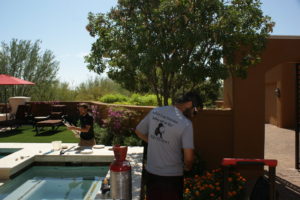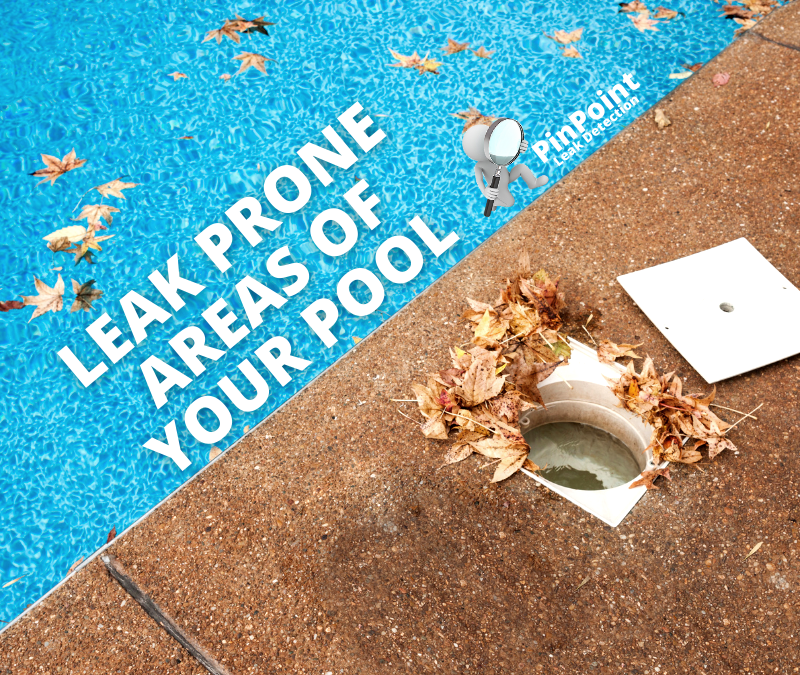Every homeowner with a pool should be aware of the responsibility it comes with. Neglecting proper care can lead to a handful of issues. One of the most common issues is a leaking pool. Pool leaks occur if you don’t properly maintain your swimming pool or repair damages when initially found. The tricky thing with pool leaks is that they can happen anywhere within your pool. If you suspect your pool has a leak, it should be dealt with immediately. Failure to do so can lead to extreme damages that can cost thousands of dollars to repair.
There are multiple reasons why pool leaks happen. Ignoring minor problems with your pool tends to lead to bigger issues. These bigger issues can eventually cause your pool to leak. Then as the pool leak gets worse, it will begin to wreak havoc on your pool. You can avoid this by dealing with minor issues upfront and following regular maintenance. Either way, you need to be prepared. Knowing which areas are prone to leaks will help you spot one before it’s too late.
Common Causes of Pool Leaks
Pool leaks occur due to a variety of issues. Some of the most common causes of pool leaks include mechanical problems, structural damage, plumbing issues, broken pipes, and broken or loose fittings. When any of these problems occur, some parts of the swimming pool and the filtration system can begin to deteriorate with time. These areas are an essential part of the swimming pool and ensure that the pool is kept clean, safe, and properly running. When these areas are not maintained, pool leaks become inevitable.
Areas Where Most Pool Leaks Occur
Detecting pool leaks can be time-consuming and complicated. Many pool leaks occur in places that are completely hidden to the naked eye such as in underground plumbing.
Some of the most common places where pool leaks happen include:
Pool Liners
Pool liners cover the swimming pool’s wall and floor structure. They completely overlay the shell of your pool and create a protective surface. The function of the pool liner is to retain the water in the swimming pool and give it a sleek look. Pool liners have a lifespan of eight to twenty years. Pool use and your maintenance practices will determine the longevity of the liner. Improper care can cause your liner to wear out faster causing it to be more leak prone.
Pool Pump
You can view the pump as the heart of the pool. Pool pumps are technically called a centrifugal force. It draws the pool water through the skimmer and the main drains. It also circulates chemicals evenly in the water in order to avoid chemical imbalance. If the pump stops running properly, water won’t filter right, and chemicals will become imbalanced. This will cause a slew of issues that can potentially lead to a pool leak if ignored.
Pool Filters
Many people confuse the pool pump for the filter, but they are not the same. The pump forces water through the skimmer in order to reach the filter, which holds back and traps dirt particles and other debris. Therefore, the main purpose of the filter is to keep the water clean and clear. The filter is an essential part of a swimming pool. It requires regular maintenance and cleaning in order to avoid damage. Like we’ve said before, failure to provide proper care is the perfect recipe for a leaking pool.
Underground Plumbing
One of the worst areas a pool leak can occur is the underground plumbing. A leaking underground pipe is bad news for your pool’s environment and your wallet. These types of leaks tend to go undetected for a longer period of time due to the fact that you can’t see them. Common signs of this type of leak are lingering wet spots in your pool decking or yard and unusually higher water bills.
Pool Skimmer
The work of a skimmer is to catch floating debris so that leaves, twigs, and insects don’t sink to the bottom of your pool. A skimmer leak is another area where pool leaks occur. Many people will not immediately consider the skimmer as a reason for the pool leak, but it shouldn’t be overlooked. This type of leak can usually be easier to identify. When inspecting the skimmer, look closely for any cracks in the spot where the skimmer meets the plaster and if you notice debris getting sucked into these crevasses.
Structural leak
This type of leak happens when the structure of a pool cracks as a result of concrete movement. This movement can stretch the surface of your pool, which can then crack, and then lead to cracks in the underlying structure. It is one of the most extensive problems associated with swimming pools, especially when you do not address it immediately. When these cracks go without repair, it will continue to grow bigger, and repairing them becomes a more in depth and expensive job. The reason for the structural leak is that water passes through the cracks, and eventually erodes the soil underneath and around the structure. Once this begins, the safety and structure of your pool can become compromised.
Pool Leaks Can Happen. Be Prepared.
As a pool owner, we advise educating yourself on the causes of leaks and what areas are prone to develop leaks if damage is done to them. While we didn’t mention it in this article much, you should also be aware of the common signs of pool leaks as well. When dealing with pool leaks, we highly recommend hiring professionals that are fully trained and equipped to run multiple tests in order to diagnose your pool for leaks. It can be a time-consuming and complicated process and should only be taken on by the best of the best.

pinpoint tech preparing for leak detection in hot tub

